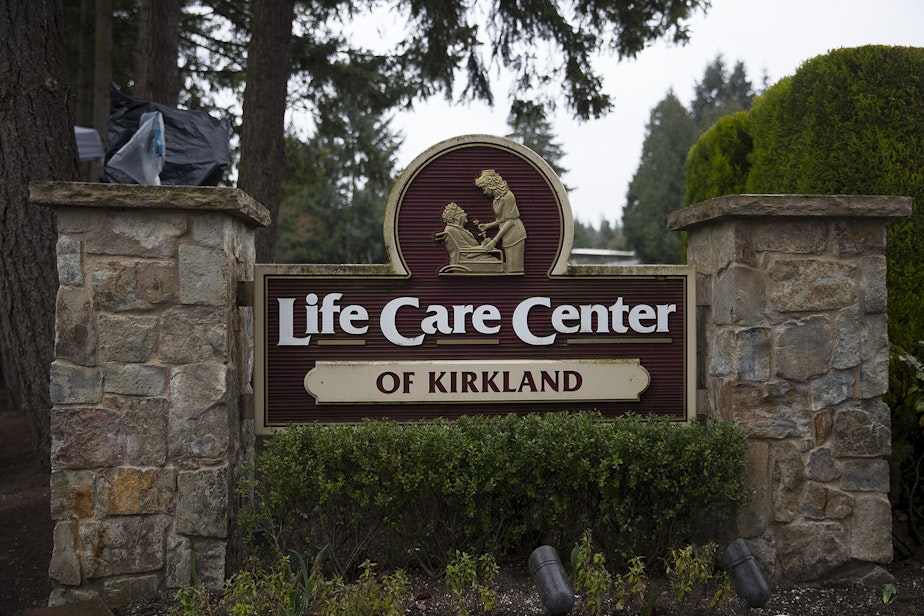Health officials make new recommendations as Coronavirus deaths rise

We learned today that six people have died from Coronavirus in Washington state. KUOW’s Anna Boiko-Weyrauch has been following the story.
This interview has been edited for clarity.
What more can you tell us about these deaths and infections?
We have six deaths total in the state-- five in King County, one in Snohomish County, and 18 confirmed cases of Coronavirus statewide. That's an increase from this morning of one.
Right now, it's just in these two counties, but this is a rapidly changing situation. These numbers can change at any time. That's what we heard today from Dr. Jeff Duchin. He's the Health Officer for Public Health Seattle & King County:
“We expect the number of cases will continue to increase in the coming days and weeks. And we're taking this situation extremely seriously. The risk for all of us of becoming infected will be increasing.”
Sponsored
What do we know about the health conditions of these patients before they became infected?
The people who died so far are men and women from their 40s to their 90s. They had some sort of underlying health condition-- chronic lung or heart disease or diabetes. And we're talking about deaths and hospitalizations, but something that health officials emphasized is that you might think that the majority of cases of Covid-19 are serious illnesses, but that's not true. Likely, there are many mild cases in the community that are not being tracked, haven't been identified, and may actually never be identified.
The number of deaths and infections are on the rise, mostly here in King County. What is the key message now from public health officials?
They're focusing on personal and community preparedness and prevention. Here's Seattle & King County Public Health Officer, Dr. Jeff Duchin again:
“Based on the level of disease in our community now, we're not recommending widespread cancellations of gatherings, or closures of schools, but we do want people to know that this infection is with us, it's going to be increasing, and there are things they can do to decrease their risk.”
Sponsored
This includes the same things we've heard again, and again: wash your hands, stay home from work if you're sick, don't touch your face or your eyes. Also, if you're someone with one of those pre-existing health conditions like heart or lung disease, or diabetes, perhaps it's time to consider limiting your exposure to public places, even though right now that is not the recommendation for everyone else:
“As we see more cases coming into the community, to protect your health, people should consider avoiding crowded settings to the extent possible. This is especially important for people who are at higher risk for infection, people over 60 years of age and people who have underlying chronic health conditions.”
I just want to frame these recommendations in a bigger context. The reason that we're hearing these messages over and over is that right now, health leaders are transitioning from what's called the containment phase to focusing on community mitigation measures. This is a strategic shift that we're in the middle of right now.
The first stage, the containment stage, is identifying and isolating cases. Now, they're focusing on advising schools and businesses on the actions that they should be taking to keep people healthy and to stop the disease from spreading.
At what point do officials tell us that they are canceling a big event and we should stay home?
Sponsored
It is a day-by-day decision that they're making right now. They're looking at both the severity of the disease and also the location. If it's spreading beyond, say, one nursing home to a lot of different places.
At some point, we don't know when, there may be a trigger. We may hear messages that it's time for the general public to stay home. What Dr. Duchin did say is that they're weighing a lot of different factors to make that decision because these so-called community mitigation measures are very disruptive:
“You know, we can't expect people to go for months and months, you know, without school and without being able to go to work or telecommute necessarily. So we want to make sure that what we do is reasonable, that it's something that's acceptable to the public, that they feel like you know, it's worth it to keep our community healthy, and that the timing and the duration are right.”
Duchin said to expect to hear more about those measures in the next two weeks.
What else should we expect going forward?
Sponsored
Today, King County Executive Dow Constantine also announced that the county is in the process of buying a motel to isolate patients and give them a place to recover. The county expects the hotel to be available for patients by the end of the week. The county is also setting up modular housing for homeless people. These are units that used to be used for oil workers in Texas.
Another thing to keep in mind is that our capacity as a state to test and identify Coronavirus infections is skyrocketing right now. We're going to see a higher number of cases identified. As a state, we began testing for Coronavirus infections locally on Friday. Now we can do several hundred specimens a day. A second lab is going to come online today or tomorrow at the University of Washington. The state is looking to increase its capacity to test thousands of specimens at one time.
Listen to the interview by clicking the play button above.





